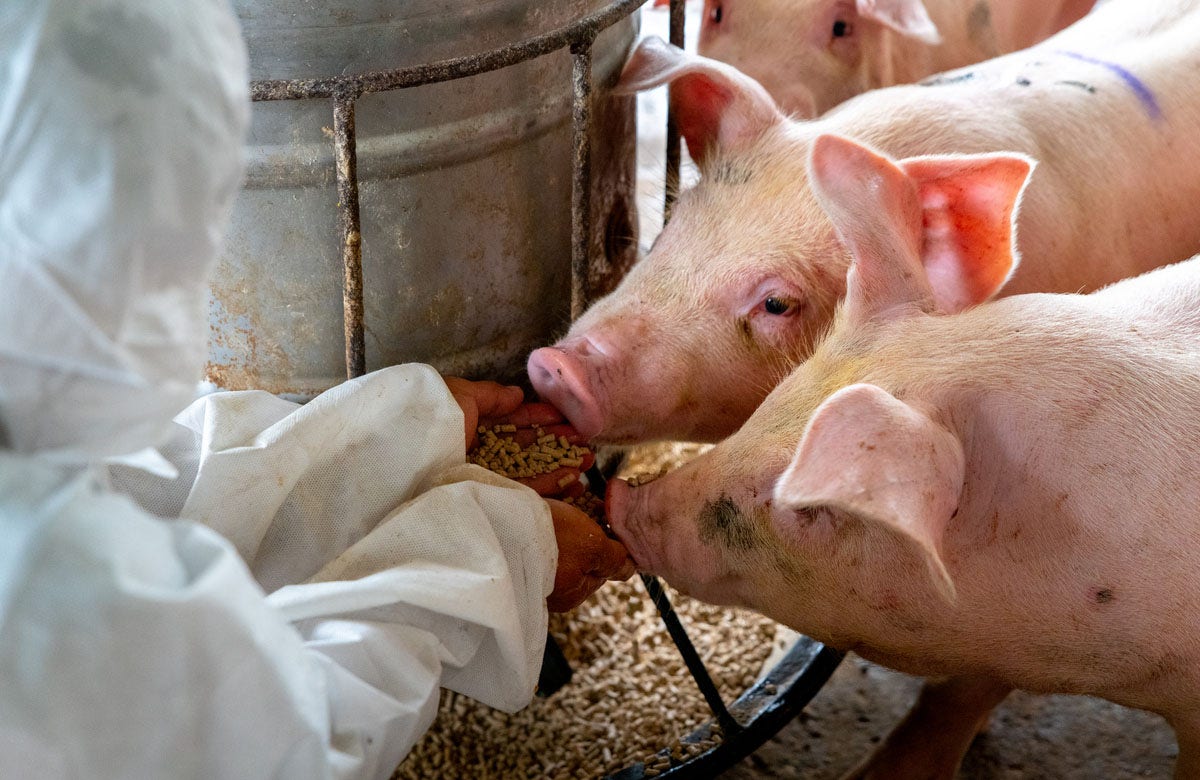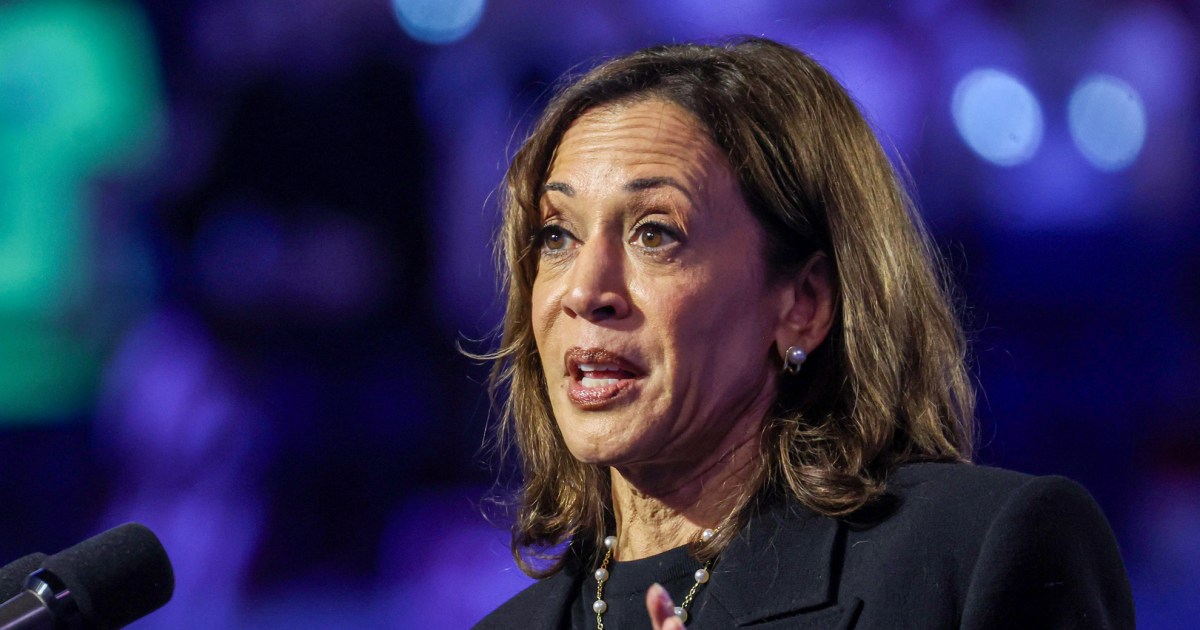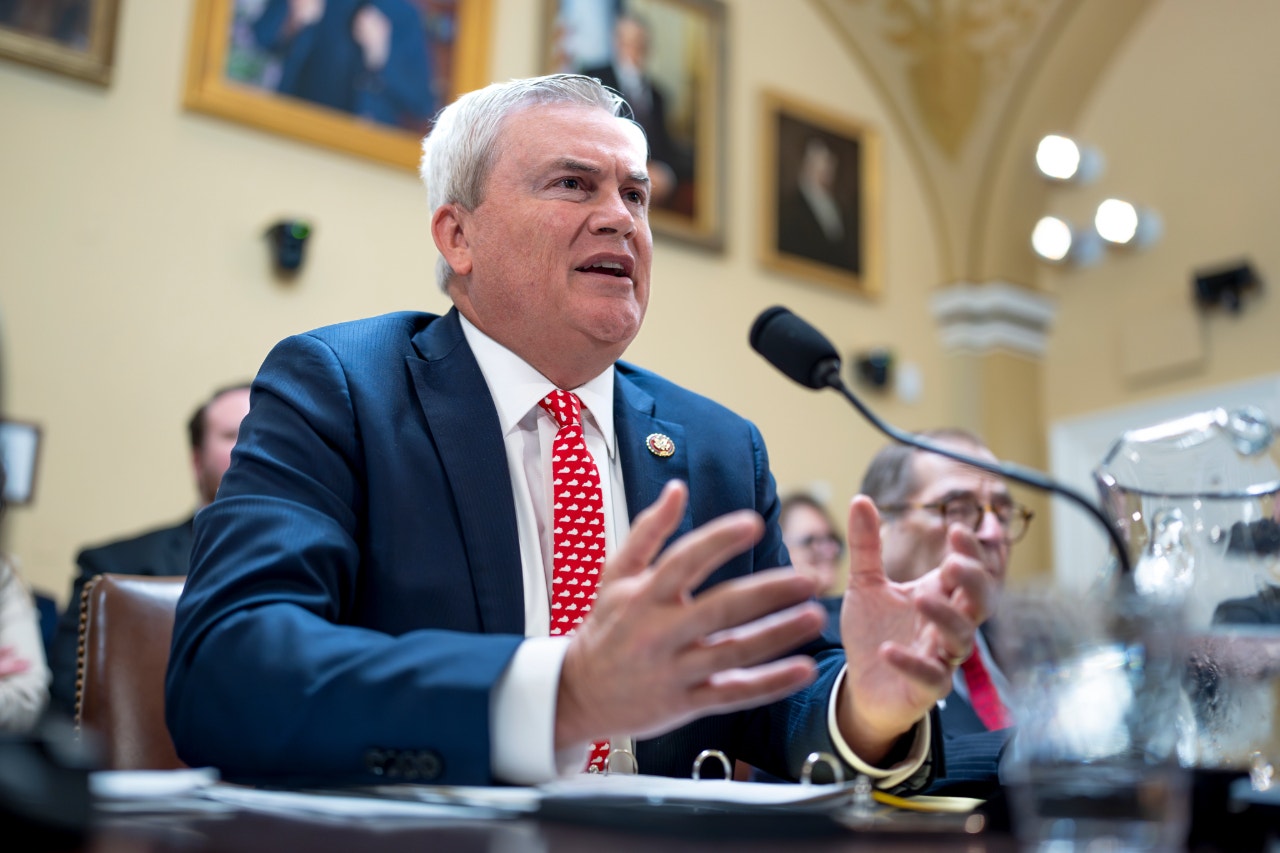Politics
Southern border migrant encounters decrease slightly but gotaways still surge under Biden

The U.S. Border Patrol recorded ar decline in migrant encounters in April, the U.S. Customs and Border Protection (CBP) said in a news release Wednesday.
In April, the Border Patrol recorded 128,900 encounters between ports of entry along the southwest border. The figure was 30% lower than in April 2023, and 6% lower than in March.
“CBP continues to surge resources and personnel to impacted sectors along the border to ensure the safe, swift, and orderly processing of individuals to maximize expedited removals,” Troy Miller, a senior official performing the duties of the commissioner, said in a statement.
DHS’ FAILURE TO FILE PAPERWORK HAS LED TO 200K IMMIGRATION COURT CASES TOSSED UNDER PRESIDENT BIDEN: TRAC
A group of over 100 migrants attempting to enter the U.S. illegally rush a border wall on March 21. Migrant encounters at the southern border declined slightly in April, border officials said. (James Breeden for New York Post / Mega)
Despite the decline, separate figures obtained by Fox News revealed there were 1.6 million known gotaways from fiscal year 2021 to fiscal year 2023. In the decade of FY 2010 through FY 2020, under former Presidents Obama and Trump, authorities recorded more than 1.4 million known gotaways.
Known gotaways are illegal immigrants seen or detected via cameras, sensors, footings, etc., but are never apprehended.
“If a person is willing to put themselves into harm’s way crossing through very remote, very dangerous conditions to evade capture, you have to ask yourself why. What makes them willing to take that risk?” Border Patrol Chief Jason Owens asked a House committee in May 2023.
BORDER PATROL OFFICIALS SAY THREAT POSED BY ‘GOTAWAYS’ AT SOUTHERN BORDER ‘KEEPS US UP AT NIGHT’
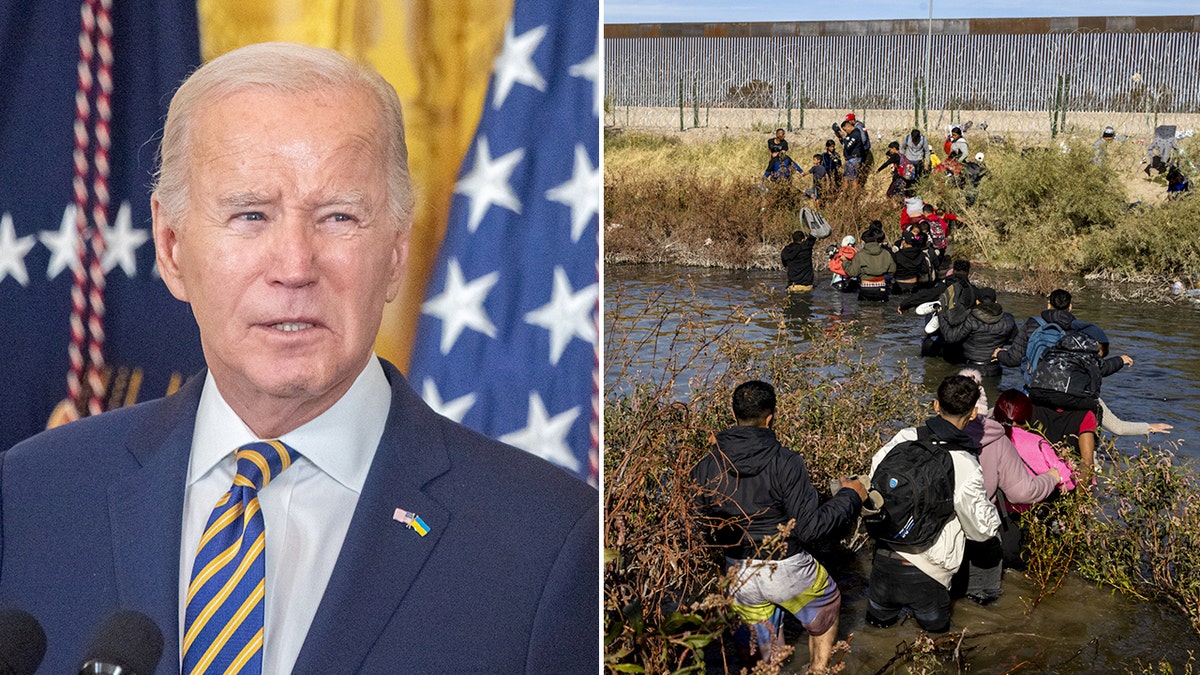
President Biden has recently touted the decline in illegal border crossings. Border authorities on Wednesday said the number of migrant encounters declined in April. (Getty Images)
“That’s of concern to me. What’s also of concern to me is I don’t know who that individual is,” he added. “I don’t know where they came from. I don’t know what their intention is. I don’t know what they brought with them. That unknown represents a risk, a threat. It’s of great concern to anybody that wears this uniform.”
In April, CBP processed 41,400 people through appointments at ports of entry submitted on the CBP One app, authorities said. Since the app was introduced in January 2023, more than 591,000 people have scheduled appointments to present at ports of entry, CBP said.
Homeland Security Secretary Alejandro Mayorkas, who has been heavily criticized for the record numbers of migrants entering the U.S., has previously noted changes in migration flow in correspondence with Congress.
“Before 2013, the majority of individuals attempting to cross the border entered without being caught,” he said in a letter in January to the House Homeland Security Committee. “Under this administration, the estimated annual apprehension rate has averaged 78%, the same average rate of apprehension as in the prior administration.”
Fox News Digital’s Adam Shaw and Bill Melugin contributed to this report.

Politics
Roy quizzes DOJ on 'coordination' with left-wing groups over suits challenging states' voter roll purges
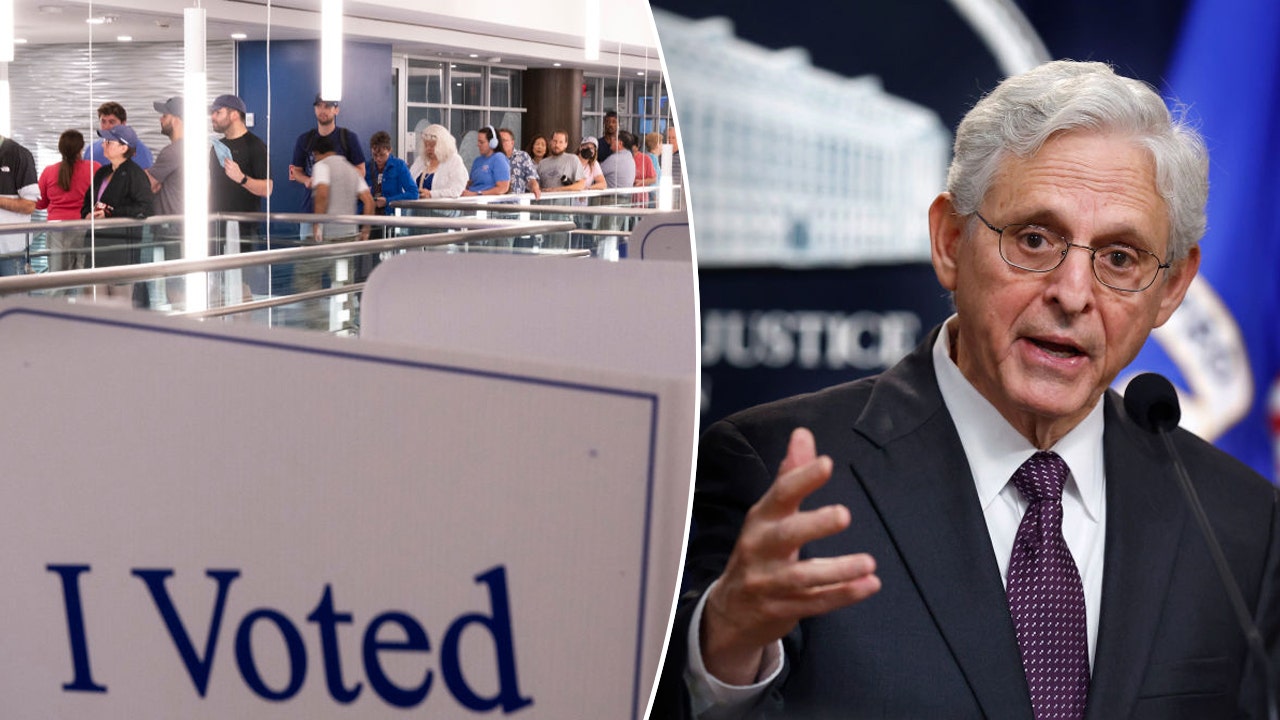
FIRST ON FOX: A top House Republican is questioning the Department of Justice about what he says is “apparent coordination” with left-wing civil rights groups over its lawsuits against two Republican-led states over efforts to remove non-citizens from its voter rolls.
“The Subcommittee on the Constitution and Limited Government is conducting oversight of the apparent coordination between the Civil Rights Division and left-wing advocacy groups to impede the ability of states to ensure the accuracy of their voter rolls,” Rep. Chip Roy, R-Texas, who is chairman of the subcommittee, says in a letter obtained by Fox Digital.
The Department of Justice sued Alabama and Virginia in recent months over their moves to remove non-citizens from the voter rolls. The DOJ has claimed that the states have violated clauses that say states must complete their maintenance program no later than 90 days before an election under a clause known as the Quiet Period Provision.
VIRGINIA AG CHEERS SUPREME COURT RULING AS ‘HUGE WIN’ FOR ELECTION INTEGRITY
Rep. Chip Roy, R-Texas, wrote to the Department of Justice requesting answers on the timing of its lawsuits.
“This systematic voter removal program, which the State is conducting within 90 days of the upcoming federal election, violates the Quiet Period Provision,” the DOJ said as it filed suit against Virginia.
Virginia has insisted that the state’s process is “individualized” and conducted in accordance with state and federal law. A lower court ordered 1,600 individuals to be restored to the voter rolls, but that has since been blocked by the Supreme Court.
The DOJ sued Alabama on similar grounds, alleging that changes to the voter registration lists took place 84 days before Election Day.
“The right to vote is one of the most sacred rights in our democracy,” Assistant Attorney General Kristen Clarke of the Justice Department’s Civil Rights Division said in a statement. “As Election Day approaches, it is critical that Alabama redress voter confusion resulting from its list maintenance mailings sent in violation of federal law.”
But Roy says the lawsuits from the DOJ came after lawsuits by left-wing civil rights groups. In the letter, Roy says that the Sept. 27 Alabama lawsuit came weeks after a Sept. 13 lawsuit from a coalition of left-wing civil rights groups. The cases were consolidated on Sept. 28.
In Virginia, a civil rights lawsuit was filed on Oct. 7, and the DOJ filed its lawsuit on Oct. 11.
SUPREME COURT TEMPORARILY HALTS LOWER COURT RULING ORDERING 1,600 VOTERS BACK ON VIRGINIA VOTER ROLLS
“The cases involve the same or similar plaintiffs and lawyers and follow a similar pattern with respect to the timing of each complaint. These circumstances raise questions as to whether the DOJ’s Civil Rights Division is working with these groups to file cases to keep noncitizens on voter rolls just before the 2024 election and prevent states from ensuring that only eligible citizens vote in federal elections,” Roy says.
He also says the DOJ “did not object to consolidating its cases with those filed by left-wing organizations and attorneys with a public history of opposing bipartisan efforts to prevent noncitizens from voting.”
Roy says many of the groups have objected to the Safeguard American Voter Eligibility (SAVE) Act, which would require proof of citizenship to vote in federal elections.
26 REPUBLICAN ATTORNEYS GENERAL JOIN VIRGINIA IN PETITIONING SUPREME COURT TO RULE ON VOTER ROLL
“The American people deserve to know whether left-wing activist groups are dictating the DOJ’s legal strategy with respect to noncitizens voting in the upcoming election,” he writes.
Roy is asking for all documents and communications relating to the lawsuits and any of the civil rights groups involved in the suits, as well as documents to show whether the DOJ plans to file any additional lawsuits against the states.
Virginia was handed a legal victory this week when the Supreme Court halted the lower court’s decision to reinstate 1,600 potential noncitizens to the rolls. A divided court granted the state’s stay application pending appeal in the Fourth Circuit Court of Appeals on Wednesday. Justices Sonia Sotomayor, Elena Kagan and Ketanji Brown Jackson dissented.
The DOJ said in a statement Wednesday after the Supreme Court’s ruling, “The Department brought this suit to ensure that every eligible American citizen can vote in our elections. We disagree with the Supreme Court’s order.”
Fox News’ Haley Chi-Sing contributed to this report.
Politics
Lakers star LeBron James endorses Kamala Harris for president
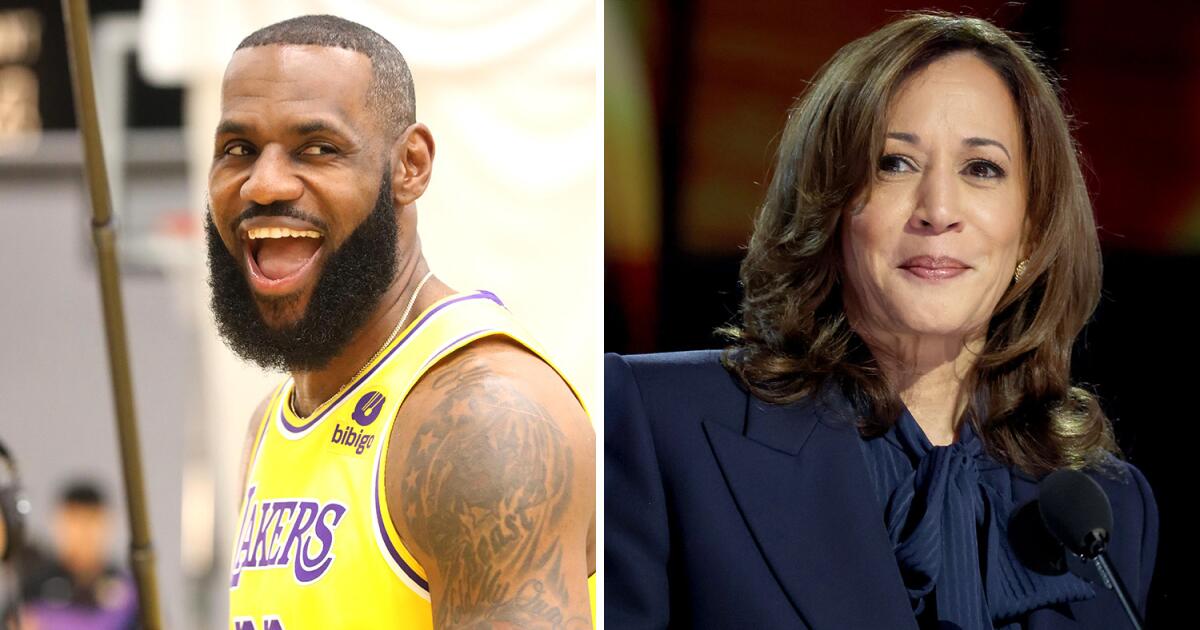
LeBron James endorsed Kamala Harris in the presidential election via a post on social media Thursday.
“What are we even talking about here?? When I think about my kids and my family and how they will grow up, the choice is clear to me. VOTE KAMALA HARRIS!!!” he posted on X along with a video beginning with a racist joke from comedian Tony Hinchcliffe and including soundbites from former President Trump.
The video ends with the phrase “Hate Takes Us Back.”
Between his Instagram and X accounts, James shared the video and endorsement to more than 200 million combined followers.
James is no stranger to playing a role in presidential politics, having formed the group More Than a Vote in 2020 in response to the racial turmoil and reckoning following the killings of George Floyd and Breonna Taylor. More Than A Vote worked with a nonpartisan voting rights group to fight voter suppression.
In 2024, WNBA star Nneka Ogwumike assumed leadership of the nonprofit, which shifted its focus to women’s freedoms.
James endorsed Joe Biden during the 2020 election and Hillary Clinton in 2016.
Politics
What Candidates in Tight House Races Are Saying About Abortion

22 Democrats say
restore Roe v. Wade.
4 Democrats say
it’s no place for government.
9 Democrats say
it’s between a woman and her doctor.
21 Republicans say
no federal ban.
10 Republicans say
it’s best left up to the states.
5 Republicans say
they’re pro-life.
Josh Riley, the Democratic challenger running for Congress in New York’s 19th District, has a clear message on abortion: “I believe that women’s health care decisions are women’s health care decisions and that politicians should stay the hell out of it.”
And his Republican opponent, the incumbent Representative Marc Molinaro, is saying nearly the same thing: “I believe health care decisions should be between a woman and her doctor, not Washington.”
Across the country’s most competitive House races, Republicans have spent months trying to redefine themselves on abortion, going so far as to borrow language that would not feel out of place at a rally of Vice President Kamala Harris. Many Republicans who until recently backed federal abortion restrictions are now saying the issue should be left to the states.
At least a half-dozen Republican candidates have put out direct-to-camera ads declaring their opposition to a federal abortion ban. Instead, they say, they support exceptions to existing state laws and back protections for reproductive health care, such as I.V.F.
Republican candidates address abortion head-on in campaign videos
Click on any video in the grid to play it.
Anthony D’Esposito
Republican, N.Y. 4
Mike Lawler
Republican, N.Y. 17
Marc Molinaro
Republican, N.Y. 19
Joe Kent Republican, Wash. 3
Michelle Steel
Republican, C.A. 45 Juan Ciscomani
Republican, Ariz. 6





Democrats have raised the possibility of a nationwide abortion ban should Republicans win in November, and they are framing the campaign as another referendum on the Supreme Court’s Dobbs decision, which overturned Roe v. Wade. They are hoping to continue their run of electoral successes since the 2022 decision to win back control of the House.
Any new federal legislation on abortion would have to pass both the House and the Senate and be signed by the president to become law. But whichever party emerges with a majority in the House will have the ability to dictate the legislative agenda, including whether measures to restrict or expand abortion access have the chance to pass.
Republicans in California and New York in particular, who are running in swing districts in blue states that favor abortion rights, have felt the most pressure to address the issue directly. “If we don’t talk about the issue, we become whatever the Democrats say we are,” said Will Reinert, the press secretary for the National Republican Congressional Committee.
To better understand how abortion is playing a role in these campaigns, The New York Times surveyed candidates from both parties in the most competitive House races about their support for federal limits on abortion. The Times also looked at voting records, issues listed on campaign websites, debate and media coverage, and endorsements from major abortion rights and anti-abortion groups.
The Times survey showed that while Republicans are notably focused on what they will not do on abortion at the federal level, their Democratic opponents are talking about what they will do to protect abortion rights. Nearly all the Democratic candidates said they supported restoring the protections of Roe v. Wade, which would allow access to abortion until fetal viability, or around 24 weeks, in every state.
In attack ads, Democrats are pointing to their opponents’ voting records or past statements as evidence of extremism — despite what they may be saying now.
Click on any video in the grid to play it.
Josh Riley campaign
Democrat, N.Y. 19
Will Rollins campaign Democrat, Calif. 41
Democratic candidates highlight Republicans’ records on abortion in campaign videos


More broadly, abortion rights groups said Republicans are misleading voters by claiming they do not support an outright abortion “ban,” when they might support a federal “limit” or “standard,” such as the 15-week proposal put forward by Senator Lindsey Graham in 2022.
“They are playing around with the semantics; they are clearly testing out different framing and messaging in an attempt to try and deceive voters because they realize how politically unpopular their policy stances are,” said Jessica Arons, a director of policy and government affairs at the American Civil Liberties Union.
Republicans in the Times survey almost universally declined to answer questions about gestational limits. Only one, Representative Don Bacon of Nebraska, said he supported a specific federal limit, in the third trimester.
“I do not support a federal abortion ban. The Dobbs decision decided this was an issue left to the states and that’s where I believe policy on the issue should be decided.”
David Valadao Republican, Calif. 22 “At the federal level, I would only support legislation to outlaw late-term abortion, with protections for the three exceptions. Otherwise, states must vote on this issue.”
Don Bacon Republican, Neb. 2
“I am pro-life, believe abortion stops a beating heart, and oppose taxpayer funded abortion. Since the U.S. Supreme Court has returned this issue to the states, I will not vote for a national abortion ban.”
Gabe Evans Republican, Colo. 8
What Republican candidates are saying about abortion
The Republican shift away from publicly supporting a federal ban follows the lead of former President Donald J. Trump, who has changed his own language on the issue after seeing the electoral backlash to the Dobbs decision.
As recently as 2021, a majority of House Republicans — including seven incumbents in this year’s tossup races — co-sponsored the Life at Conception Act, a bill that would have amounted to a nationwide abortion ban. This year, Representative Scott Perry of Pennsylvania’s 10th District was the only incumbent in a competitive race to stay on as a co-sponsor.
Two Republican incumbents who now say they oppose a national ban — Representatives Ken Calvert and David Valadao in California — voted in favor of a 20-week ban that passed the House in 2017. Representative Mariannette Miller-Meeks, an Iowa Republican, co-sponsored a 15-week ban on abortion in 2022. She did not respond to questions about whether she still supports it.
Other Republicans described themselves as personally “pro-life” but said they accepted the abortion laws in place in their states. Rob Bresnahan Jr., a challenger in Pennsylvania’s 8th District, said he supported the state’s current law, which allows abortion until 24 weeks.
Democrats, when they were not attacking Republicans, leaned into language about personal freedom, with many in the survey saying the government should not be involved in medical decisions.
Another common refrain was that the decision to have an abortion should be “between a woman and her doctor.” Two Democrats used similar language rather than explicitly calling for federal abortion protections.
“Abortion is health care. This is not a place for government interference. I trust every person I know and love, and any New Mexican to make that decision for themselves.”
Gabe Vasquez Democrat, N.M. 2
“I have always believed that this decision should be left between a woman, her doctor and within her own faith.” Rudy Salas Democrat, Calif. 22
“I believe the decisions a woman makes for her body and her family are deeply personal and politicians have no place telling her what she can and cannot do.”
Tony Vargas Democrat, Neb. 2
What Democratic candidates are saying about abortion
By appearing to moderate their stance on abortion, candidates have risked losing the backing of prominent advocacy groups. Only three Republicans in the tossup races received an endorsement from Susan B. Anthony Pro-Life America, and seven received one from National Right to Life.
Two major abortion rights groups, by contrast, endorsed nearly all the Democratic candidates. Planned Parenthood — whose political action fund is pouring $40 million into the campaign — endorsed all but six candidates, while Reproductive Freedom for All endorsed all but four.
Anderson
Va. 7
Bacon* Neb. 2
Buckhout
N.C. 1
Begich
Alaska At-Large Ciscomani*
Ariz. 6
Miller-Meeks*
Iowa 1
Nunn* Iowa 3
Perry*
Pa. 10
Schweikert*
Ariz. 1 Altman
N.J. 7
Baccam
Iowa 3 Bohannan
Iowa 1
Bynum
Ore. 5
Caraveo* Colo. 8
Cartwright*
Pa. 8
Davis*
N.C. 1 Engel
Ariz. 6
Gillen
N.Y. 4
Endorsements from major anti-abortion groups
Candidate
Susan B. Anthony Pro-Life America
National Right to Life
Endorsements from major abortion rights groups
Candidate
Planned Parenthood
Repro. Freedom for All
Representative Jared Golden, the Democratic incumbent in Maine’s 2nd Congressional District — an area Mr. Trump won by six points in 2020 — did not get Planned Parenthood’s endorsement this year. He said the reason was his vote for the 2024 defense policy bill, which included an amendment blocking reimbursement for abortion travel costs for service members.
Mr. Golden said he was not concerned about the lack of support from the group, pointing instead to his co-sponsorship of the Women’s Health Protection Act, a bill to restore the protections of Roe.
“I’m quite confident that voters in Maine know where I stand,” he said.
Compare statements from House candidates on abortion policy
The New York Times asked candidates and their campaigns about support for a federal minimum standard on abortion. Statements have been lightly edited for length and clarity.
|
Mary Peltola* No response to survey. “Roe v. Wade set a precedent that was the law of the land for 50 years. She believes that standard was the right one — furthermore we know the importance of having strong exceptions for rape, incest, life of mother and health of mother throughout.” |
Nick Begich No response to survey. “While I strongly support efforts that defend the rights of those not yet born, the courts have made it clear, abortion is a state issue and not an issue for the federal government to decide.” |
|
Amish Shah No response to survey. “As a doctor, I understand that these personal decisions should be made by women and their physicians. That’s why we need to codify Roe v. Wade and give women across the country the right to control their own bodies and health care.” |
David Schweikert* No response to survey. “It’s pretty clear that it belongs to the states,” via Business Insider. |
|
Kirsten Engel No response to survey. “Protecting women’s reproductive freedoms at the federal level will be one of my top priorities when elected to Congress. Women had those protections for over 50 years when Roe v. Wade was the law of the land, and that is what I will advocate for us to return to.” |
Juan Ciscomani* No response to survey. “I’m pro-life, I reject the extremes, and I trust women. I’m against a federal ban on abortion. I’m for timetables and exceptions, including for rape, incest and the life of the mother,” via campaign site. |
|
Adam Gray No response to survey. “What I support and will vote for is restoring Roe v. Wade into federal law so that women regain the federal rights they had for generations.” |
John Duarte* No response to survey. “Congressman Duarte opposes federal abortion restrictions.” |
|
Rudy Salas No response to survey. “I have always believed that this decision should be left between a woman, her doctor and within her own faith. Women should have the freedom to choose what happens with their own bodies and to determine their own health care.” |
David Valadao* No response to survey. “I do not support a federal abortion ban. The Dobbs decision decided this was an issue left to the states and that’s where I believe policy on the issue should be decided.” |
|
George Whitesides No response to survey. “I strongly support a woman’s right to make her own health care decisions, and if elected to Congress, I will vote to codify Roe v. Wade to ensure reproductive freedom for all Americans.” |
Mike Garcia* No response to survey. “I oppose a national abortion ban — California’s law on abortion stays the law — and I support exceptions for rape, incest and life of the mother.” |
|
Will Rollins No response to survey. “I support a federal minimum standard for abortion. In Congress, I will advocate for legislation that restores Roe v. Wade, which prohibits states from banning abortions before fetal viability. It’s critical that we protect a woman’s right to choose nationwide.” |
Ken Calvert* No response to survey. “Congressman Calvert does not support a federal abortion ban and supports the right of Californians to determine this for themselves.” |
|
Derek Tran No response to survey. “Derek Tran supports enshrining reproductive rights into law as California voters did through Proposition 1 in 2022.” |
Michelle Steel* No response to survey. “Michelle’s position has always been, and remains, that this issue is best left up to the states, and she does not support a national ban on abortion.” |
|
Yadira Caraveo* No response to survey. “Rep. Caraveo believes we need to codify Roe v. Wade. This was the law of the land for decades, and since the Dobbs decision, the lives of far too many women have been at risk.” |
Gabe Evans No response to survey. “I am pro-life, believe abortion stops a beating heart, and oppose taxpayer-funded abortion. Since the U.S. Supreme Court has returned this issue to the states, I will not vote for a national abortion ban.” |
|
Christina Bohannan No response to survey. “On Day 1 in Congress, I will work to codify Roe v. Wade and ensure women in Iowa and across the country once again have the freedom to make their own health care decisions.” |
Mariannette Miller-Meeks* No response to survey. “The congresswoman has been clear that she is pro-life with the exceptions of rape, incest, and life of the mother.” |
|
Lanon Baccam No response to survey. “It’s more important than ever to restore the protections of Roe v. Wade, and that’s why I’ll support the Women’s Health Protection Act in Congress. I believe women’s health care decisions should be between her and her doctor — not politicians.” |
Zach Nunn* No response to survey. “He is pro-life, but has voted for exceptions. He opposes a national abortion ban.” |
|
Jared Golden* No response to survey. “I’m a cosponsor of the Women’s Health Protection Act, to restore Roe, and I would vote for it if it came to the floor again.” |
Austin Theriault No response to survey. “Austin opposes and will vote against a national abortion ban.” |
|
Curtis Hertel No response to survey. “When Roe was overturned and abortion rights came under attack in our state, I worked across the aisle to get rid of the 1931 abortion ban and fought to enshrine abortion rights in Michigan’s constitution. I’m running to make Roe the law of the land and protect reproductive freedom.” |
Tom Barrett No response to survey. “Tom does not support a federal ban. He has consistently argued this is a decision for the states and while he disagrees with Prop. 3, Michigan voters have made that decision.” |
|
Kristen McDonald Rivet No response to survey. “After Roe was overturned, I protected abortion rights in Michigan by helping to repeal our state’s 1931 ban without exceptions for rape or incest. In Congress, I’ll fight for a federal law restoring the Roe standard across America.” |
Paul Junge No response to survey. “I would never and have never supported a national abortion ban.” |
|
Tony Vargas No response to survey. “I believe the decisions a woman makes for her body, and her family, are deeply personal and politicians have no place telling her what she can and cannot do. In Congress, I’ll vote to codify the protections earned from the Roe v. Wade decision into federal law.” |
Don Bacon* No response to survey. “I support the Nebraska law that puts a reasonable three-month restriction on abortions with exceptions for rape, incest and the health of the mother. At the federal level, I would only support legislation to outlaw late-term abortion, with protections for the three exceptions. Otherwise, states must vote on this issue.” |
|
Gabe Vasquez* No response to survey. “Abortion is health care. This is not a place for government interference. I trust every person I know and love, and any New Mexican, to make that decision for themselves.” |
Yvette Herrell No response to survey. “Yvette has been clear that since the Dobbs decision returned abortion policy to the states, she does not support a federal ban.” |
|
Sue Altman No response to survey. “Sue will work to protect access to contraception, reproductive choice, and women’s health,” via campaign site. |
Thomas Kean Jr.* No response to survey. “Tom is opposed to a national abortion ban. He has voted to protect access to mifepristone and believes any legislation should be left to the voters of each state to advocate for their positions to their legislatures.” |
|
Mondaire Jones No response to survey. “We must enshrine protections for abortion into federal law.” |
Mike Lawler* No response to survey. “He does not and never will support a national abortion ban.” |
|
Josh Riley No response to survey. “I believe that women’s health care decisions are women’s health care decisions and that politicians should stay the hell out of it. In Congress, I will codify the right to abortion as it existed under Roe v. Wade into law.” |
Marc Molinaro* No response to survey. “I believe health care decisions should be between a woman and her doctor, not Washington. I kept my promise to reject a national abortion ban — keeping New York’s laws in place.” |
|
Laura Gillen No response to survey. “The standard should be the same as it was the day before the disastrous Dobbs decision. It worked for a half a century, and we should return to it.” |
Anthony D’Esposito* No response to survey. “Congressman D’Esposito does not support a nationwide abortion ban and believes legislating on abortion should fall under the purview of state governments.” |
|
Don Davis* No response to survey. “Congress must take action and codify Roe v. Wade. He firmly believes that a woman’s health decisions should remain private between her and her doctor,” via campaign site. |
Laurie Buckhout No response to survey. “As the only candidate to be endorsed by the pro-life SBA (Susan B. Anthony) List, I believe every life is precious and would vote to preserve life, including the mother’s,” via The Perquimans Weekly. |
|
Emilia Sykes* No response to survey. “Congresswoman Sykes has a strong record of supporting the protections provided under Roe that give women across the country the right to make decisions about what is best for their bodies.” |
Kevin Coughlin No response to survey. “Issues related to abortion are best left to the states, and there should be no federal ban.” |
|
Janelle Bynum No response to survey. “Rep. Bynum supports codifying Roe v. Wade into federal law so that women across the country can have those rights back. This is a decision that should be kept between a woman and her doctors.” |
Lori Chavez-DeRemer* No response to survey. “The congresswoman doesn’t support any federal standard limiting Oregonians’ access to abortion.” |
|
Susan Wild* No response to survey. “I have always believed that private medical decisions, including whether or not to receive abortion care, should be made by a woman, her doctor, her partner and her faith if she so chooses.” |
Ryan Mackenzie No response to survey. “He’s opposed to a national abortion ban; he supports exceptions for rape, incest, and life of the mother.” |
|
Matt Cartwright* No response to survey. “I strongly support the Women’s Health Protection Act, which would restore Roe’s protections into federal law. We should trust women with their health care decisions, not politicians.” |
Rob Bresnahan Jr. No response to survey. “Rob Bresnahan does not support a national abortion ban and does support the current Pennsylvania protections of 24 weeks and exceptions for rape, incest, and the life of the mother. ” |
|
Janelle Stelson No response to survey. “I think these most intimate health care decisions should be made by women and their doctors … If elected, I will put those decisions back in the hands of women, where they belong.” |
Scott Perry* No response to survey. “Scott Perry believes firmly in the sanctity of Life — period. He makes exceptions for circumstances that involve rape, incest and danger to the life of the mother,” via campaign site. |
|
Eugene Vindman No response to survey. “In Congress, I will fight to make sure that the rights of women and girls in Virginia are never dependent on politicians in Richmond or Washington by voting to restore the protections of Roe nationwide.” |
Derrick Anderson No response to survey. “Derrick opposes and would vote against a national abortion ban.” |
|
Marie Gluesenkamp Perez* No response to survey. “Marie is an original co-sponsor of the Women’s Health Protection Act and supports codifying the abortion protections of Roe v. Wade in federal law, as well as ensuring women have continued access to contraception and I.V.F.” |
Joe Kent No response to survey. “Following the Supreme Court decision that made abortion a state issue, Joe Kent opposes any new federal legislation on the issue.” |
Methodology
The New York Times survey asked candidates or their campaigns two questions: 1) Do you support any federal minimum standard on abortion? 2) If so, until how many weeks in pregnancy (i.e. 6 weeks, 15 weeks, viability, etc.)?
Those surveyed were major-party candidates for the U.S. House of Representatives whose races were rated “tossups” by the Cook Political Report at any point in October 2024. Alaska’s at-large congressional district includes four candidates and will be decided by ranked-choice voting; the two candidates who received the most votes in the primary were included in the survey. All but six candidates responded to emailed requests for comment. In these cases, position summaries were taken from campaign websites or from other public statements.
Note: Counts of candidate statements in the top graphic were taken from survey responses only.
Additional work by June Kim.
-

 Movie Reviews1 week ago
Movie Reviews1 week agoAlien Country (2024) – Movie Review
-
/cdn.vox-cdn.com/uploads/chorus_asset/file/25431700/STK201_SAM_ALTMAN_CVIRGINIA_A.jpg)
/cdn.vox-cdn.com/uploads/chorus_asset/file/25431700/STK201_SAM_ALTMAN_CVIRGINIA_A.jpg) Technology7 days ago
Technology7 days agoOpenAI plans to release its next big AI model by December
-

 Health6 days ago
Health6 days agoNew cervical cancer treatment approach could reduce risk of death by 40%, trial results show
-

 Culture7 days ago
Culture7 days agoTop 45 MLB free agents for 2024-25 with contract predictions, team fits: Will Soto get $600M+?
-

 Sports5 days ago
Sports5 days agoFreddie Freeman's walk-off grand slam gives Dodgers Game 1 World Series win vs. Yankees
-
News5 days ago
Sikh separatist, targeted once for assassination, says India still trying to kill him
-

 Culture5 days ago
Culture5 days agoFreddie Freeman wallops his way into World Series history with walk-off slam that’ll float forever
-

 Technology4 days ago
Technology4 days agoWhen a Facebook friend request turns into a hacker’s trap

